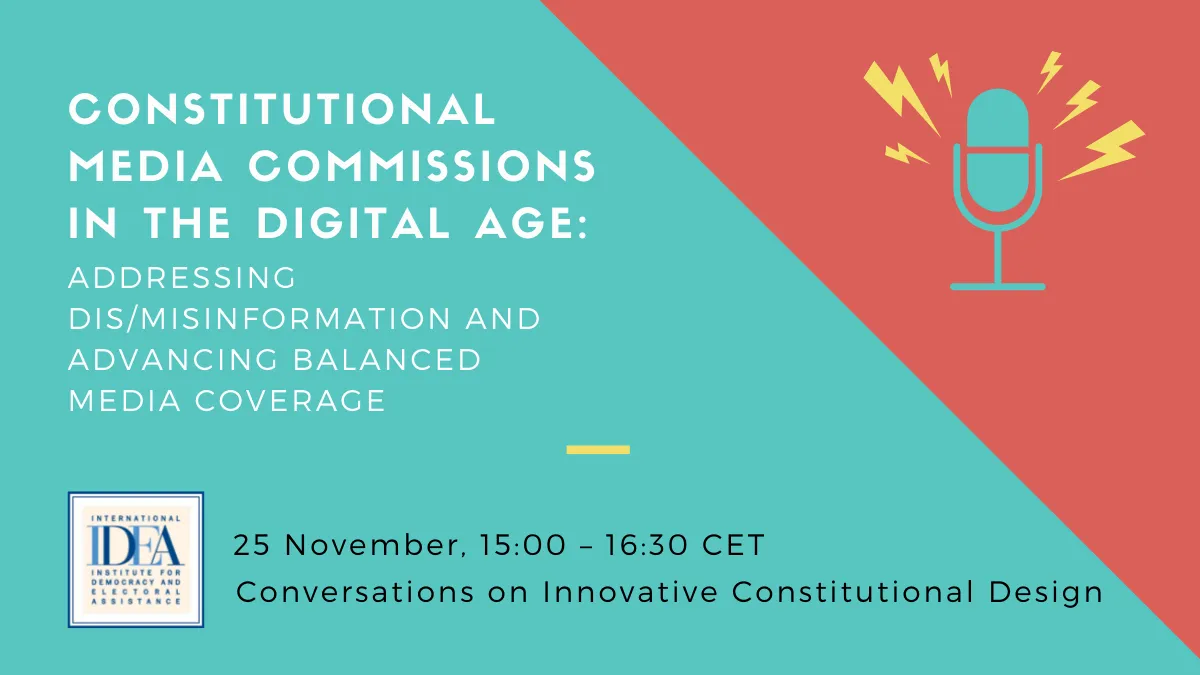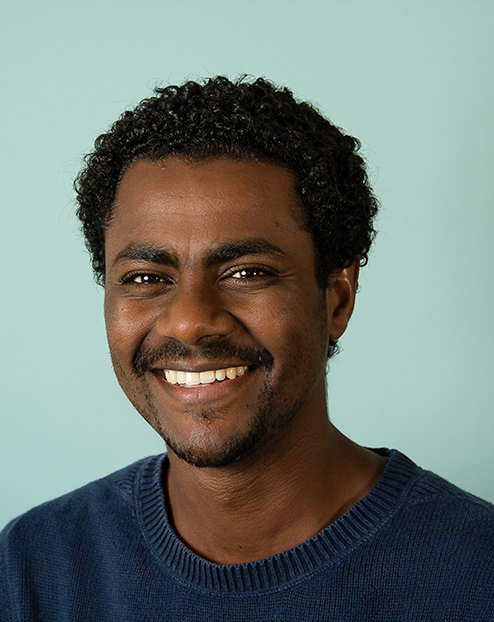Role of Constitutional Media Commissions in Addressing the Challenges of Dis/Misinformation and Advancing Balanced Media Coverage

As part of the webinar series entitled Conversations on Innovative Constitutional Design Options, International IDEA’s Constitution-Building Programme hosted on 25 November 2021 an expert panel to discuss the role of Constitutional Media Commissions and their role in enabling media freedom, ensuring balanced media coverage, and addressing contemporary challenges of dis/misinformation, with case-studies from Armenia, Ghana, Poland and Tunisia.
The expert panellists from the four countries discussed the potential added value of constitutional establishment of Media Commissions in advancing the aforementioned objectives in a neutral fashion, but also the challenges the commissions have faced in the countries of focus.
Armenia
The Armenian Television and Radio Commission is charged with promoting the freedom, independence and plurality of broadcast media. Nevertheless, despite a supermajority requirement in the process of appointment of members of the Commission, in practice, dominant political groups have managed to secure the required numbers to politicise the appointment process and the Commission, which negatively affects its mandate to promote and support media freedom and balance of coverage. Accordingly, while such commissions have a potential added value, priority should be given to self-regulation, as powerful and politicized commissions could cloak government intervention in media freedom. Rethinking the process of appointment, including ensuring diversity and considering an increased role for civil society in the appointment of members, could contribute to the effectiveness of such commission.
Ghana
The discussions revealed that the Ghanaian Media Commission has supported media freedom and has particularly performed well in protecting the autonomy and balance of coverage of publicly-funded media. The constitutional guarantee of its independence and its composition, which is unique even among other Ghanaian fourth-branch institutions as its members represent a variety of stakeholders, rather than merely being presidential appointees, has enabled the Commission’s performance. Nevertheless, it has not had notable roles in addressing the challenge of dis/misinformation, partly because of the legislative establishment of a parallel National Communications Authority, a body under the executive, encroaching on functions that could have fallen under the Commission’s mandate. While the Constitution leaves the possibility of expanding the mandate of the Media Commission to establish standards and monitor and address dis/misinformation, including in modern ‘social’ media, this has not happened.
Poland
The Polish National Council of Radio Broadcasting and Television was similarly constitutionally designed to enable media freedom and ensure balanced media coverage. The Council played a notable role in this regard during Poland’s transition to democracy prior to 2015. Nevertheless, the limited constitutional provisions regarding the composition and mandate of the Council have allowed the current ruling party to temper the functions of the Council. In addition, the government established in 2016 a parallel National Media Council which, among others, hires and fires personnel for state television and radio. The Media Council has also used public resources against private media critical of government narratives. In combination, the latter has challenged the promotion of balanced media coverage, and while there is some effort to engage issues of dis/misinformation, this itself has been politicized.
Tunisia
Tunisia’s constitutional Audio-Visual and Communication Commission has contributed to media freedom that has remained one of the crown achievements of the post-2011 period, despite the political instability the country continues to face. In addition to protecting media freedom, the Authority has sought to controversially control what are considered ‘extremist’ ideas, including dis/misinformation, as part of its mandate to ensure media ‘integrity’ and plurality. The Authority also works closely with the Independent High Authority for Elections to manage media plurality close to elections. Nevertheless, limited mandate, resources and attempts at political interference have reduced its contributions, particularly in dealing with the challenges of new technologies.
Overall, there was a common understanding that independent constitutional media commissions have a crucial role in advancing media freedom, plurality and even addressing the challenges of dis/misinformation. The experiences from the four countries provide important lessons on the importance of deliberate constitutional design that guarantees their mandate, including against the establishment of parallel entities to undermine their functions, ensuring appointment processes that preclude government capture, and the provision of adequate resources. Better constitutional design, such as through representation of a wide range of stakeholders and limited government role in the appointment of members of the Ghana Media Commission, could make a difference in practice.
The case studies offer important lessons for constitutional designers and advocates of environmental justice. The recording of the conversation—available on YouTube—captures these insights and anecdotes, which will provide inputs for a knowledge resource that the Constitution-Building Programme will develop in due course.
Kimana Zulueta-Fuelscher, Acting Head, Constitution-Building Programme, hosted the event, while Adem K. Abebe, Programme Officer, Constitution-Building Programme, served as moderator.
Expert panels:
- Armenia: Boris Navasardian, President, Yerevan Press Club, Yerevan, Armenia
- Ghana: Professor Kwesi Prempeh, Director, the Centre for Democratic Development, Accra, Ghana
- Poland: Professor Miroslaw Wroblewski, Director, Constitutional, International and European Law Department Office of the Commissioner for Human Rights
- Tunisia: Professor Hajer Gueldich, Faculty of legal, Political and Social Sciences, Tunis-University of Carthage; Member, African Union Commission on International Law




